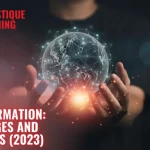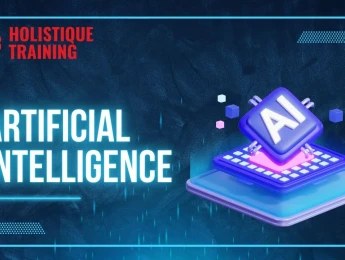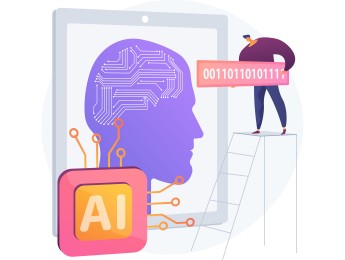Effective business communication is paramount in today's globalised economy, serving as the cornerstone for successful operations, collaborations, and relationships. Clear and concise communication fosters understanding, alignment, and synergy among stakeholders, whether they are internal teams, clients, or partners across different regions.
Developing technology plays a pivotal role in enhancing communication for global businesses by offering various tools and platforms tailored to address various communication needs. Advanced email systems, instant messaging applications, video conferencing platforms, and collaborative workspace tools enable seamless interactions, irrespective of geographical boundaries and time zones.
Emerging technologies such as artificial intelligence and natural language processing are also revolutionising communication by automating routine tasks, facilitating real-time translation, and enabling personalised interactions.
By leveraging these technological advancements, global businesses can bridge communication gaps, promote transparency, and foster stronger connections, ultimately driving efficiency, innovation, and competitiveness in the dynamic global marketplace.
Upon completion of this course, participants will be able to:
- Identify various communication styles to enhance comprehension and establish connections with others.
- Evaluate different communication methods to determine their appropriateness in various contexts.
- Recognise the significance of nonverbal cues such as body language and vocal inflexion in successful communication.
- Deliver messages in a compelling and impactful manner tailored to the recipient.
- Enhance the efficacy of written communication, including reports, proposals, emails, and letters.
- Streamline writing processes to optimise project management.
- Tailor communication to meet the specific needs and objectives of diverse audiences.
- Cultivate presentation abilities and employ techniques to maximise effectiveness and influence.
- Find appropriate techniques, tools, and competencies to address diverse communication challenges effectively.
This course is designed for anyone responsible for communication across a globally recognised business or for professionals assigned to the task of discovering new and efficient technologies specifically to aid global communication. It would be most beneficial for:
- Business Owners
- Chief Executives
- Operations Managers
- Communications Managers
- PR Professionals
- Marketing Managers
- Social Media Professionals
- Customer Service Managers
- Supervisors for Remote Workers
This course uses various adult learning styles to aid full understanding and comprehension. Participants will review a variety of communication tools ideal for remote business communication and project management, see live demonstrations, and understand the benefits of each system.
They will also discuss technological changes and the wider social and economic environment to understand the implications of changing technologies and communication for their business.
Day 5 of each course is reserved for a Q&A session, which may occur off-site. For 10-day courses, this also applies to day 10
Section 1: The Importance of Business Communication
- Understanding the fundamentals of effective business communication.
- Presentation skills and public speaking for effective communication.
- Conflict resolution and negotiation through communication.
- Building and maintaining professional relationships through communication.
- Communication strategies for leadership and management roles.
- Ethical considerations in business communication practices.
- Crisis communication and reputation management.
Section 2: Using Technology to Improve Business Communication
- Email etiquette and best practices.
- Utilising instant messaging and collaboration platforms effectively.
- Video conferencing tools for remote communication.
- Virtual team communication and collaboration strategies.
- Integrating communication tools with project management software.
- Social media for business communication and networking.
- Customer relationship management (CRM) systems for communication.
- Voice over Internet Protocol (VoIP) solutions for cost-effective communication.
- Mobile communication apps and their impact on business interactions.
- Data security and privacy considerations in digital communication.
Section 3:Effective Reporting & Planning Through Remote Tools
- Measuring and evaluating the effectiveness of business communication strategies.
- Quantitative and qualitative methods for evaluating communication effectiveness.
- Surveys and feedback mechanisms for assessing communication impact.
- Communication channels and their efficiency.
- Assessing audience engagement and comprehension.
- Monitoring communication outcomes and behaviours.
- Evaluating the influence of communication on organisational goals.
- Incorporating data analytics and metrics into communication evaluation.
- Continuous improvement strategies based on evaluation findings.
Section 4: Delivering a Message to Remote Workers
- Verbal communication skills in the workplace.
- Written communication techniques for business correspondence.
- Non-verbal communication cues and their impact.
- Interpersonal communication in team settings.
- Cross-cultural communication considerations in global business contexts.
Section 5: Presenting a Communication Project Idea
- Practising effective delivery techniques, including body language and voice modulation.
- Anticipating and addressing potential questions or objections from the audience.
- Incorporating feedback and refining the presentation based on input.
- Adhering to time constraints and managing the pace of the presentation.
- Emphasising the value proposition and benefits of the communication project idea.
- Demonstrating confidence and professionalism during the presentation.
- Leveraging storytelling techniques to engage and captivate the audience.
Section 6: Communication Tools Using the Changing Technology
- Digital communication tools and their role in modern business.
- Social media management for business communication.
- Remote access and VPN usage for secure connectivity.
- Slack.
- Microsoft Teams.
- Zoom.
- Google Meet.
- Trello.
Upon successful completion of this training course, delegates will be awarded a Holistique Training Certificate of Completion. For those who attend and complete the online training course, a Holistique Training e-Certificate will be provided.
Holistique Training Certificates are accredited by the British Assessment Council (BAC) and The CPD Certification Service (CPD), and are certified under ISO 9001, ISO 21001, and ISO 29993 standards.
CPD credits for this course are granted by our Certificates and will be reflected on the Holistique Training Certificate of Completion. In accordance with the standards of The CPD Certification Service, one CPD credit is awarded per hour of course attendance. A maximum of 50 CPD credits can be claimed for any single course we currently offer.
- Course Code IND02-117
- Course Format Classroom, Online,
- Duration 5 days














